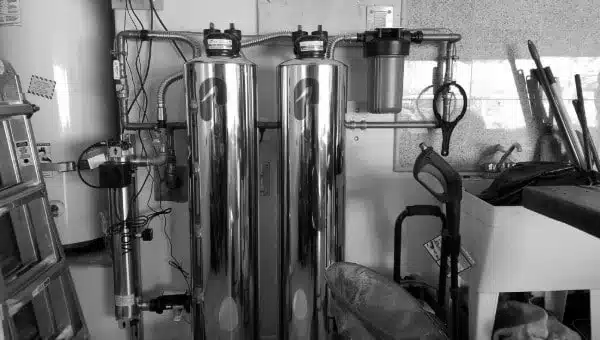You’ve probably heard about water softeners and how they can improve the quality of your water, but what you might not know is how simple it can be to install one yourself. With the right knowledge, tools, and a bit of patience, you can have your own water softener installed in no time. So why not avoid high costs and professional plumbers, and take matters into your own hands?
Table of Contents
Understanding the Importance of Water Softeners
Ever wondered why water softeners are gaining popularity among homeowners? Here’s the lowdown. These vital appliances work their magic by filtering out excess minerals such as calcium and magnesium that make your water hard.
Why is this important, you ask? Hard water, while not a health risk, can be quite a menace in the home. Its high mineral content leaves behind deposits known as scale, which can build up in your faucets and appliances. This buildup not only reduces the efficiency of your water heater, dishwasher, and washing machine, but can also shorten their lifespan, costing you more in the long run.
Aside from being a silent killer of appliances, hard water isn’t a favorite in the beauty department either. Ever noticed how your skin feels dry and itchy or your hair looks dull and lifeless after a shower? Blame it on hard water! By softening your water, you’ll notice improvements in your hair and skin’s texture and appearance, giving you that glowing look you’ve always desired.
But it’s not all about personal appearance and household appliances. By investing in a water softener, you can also cut down on energy costs. You see, when your appliances are free from scale buildup, they run more efficiently and consume less energy.
So, while the thought of installing a water softener might feel like an unnecessary cost now, it’s really an investment in the long-term health of your plumbing, appliances, and even your skin and hair. Now, isn’t that worth considering?
Deciding on the Perfect Water Softener for Your Home
Navigating the world of water softeners might initially feel like a daunting task with the myriad models that crowd the market. But fear not! The perfect fit for your home is indeed within your reach. Essentially, it boils down to three critical factors: the size of your household, the hardness level of your water, and your financial plan.
Let’s begin with your household size. This will determine the capacity of the water softener you need. A couple living alone, for example, won’t need a softener as powerful as a bustling family of five. The harder your water, the stronger your softener needs to be, so your water’s hardness level is the next vital factor to consider.
How can you determine your water hardness level, you ask? Well, many municipalities provide this information, but you can also purchase a water hardness test kit for a more precise measurement. Remember, the harder your water, the more robust your softener needs to be.
Finally, consider your budget. Water softeners come in a wide price range, so determine how much you’re willing to invest in this critical appliance. Just keep in mind, the upfront cost of a water softener could save you money down the line in reduced energy costs and extended appliance lifetimes.
Selecting the right water softener might seem complicated at first, but once you’ve evaluated these factors, you’ll be well on your way to making an informed decision. Don’t be afraid to seek professional advice or delve into the wealth of online resources to help guide you on your journey to softer water. Because after all, your home deserves the best.
Related Content: Whole House Water Filter
Gathering Your Tools and Preparing Your Workspace
Alright, let’s roll up those sleeves and get down to business! Before we dive into the nitty-gritty of the installation process, let’s get organized. Having the right tools at hand and a well-prepared workspace can make this DIY project a smooth and enjoyable experience. You don’t want to be scrambling for a wrench mid-installation, right?
The tools you might need for this project are a pipe cutter, an adjustable wrench, and some Teflon tape. Safety should never take a backseat, so make sure you have gloves and goggles handy as well. We all know that a little precaution goes a long way.
Now that we have our tools, let’s prep our workspace. Identify the perfect spot for your new water softener – somewhere with plenty of space for both the unit and for you to maneuver during installation. You don’t want to end up in a game of Twister with your water softener, do you?
Before getting started, it’s crucial to shut off your water supply. Not doing so can result in a messy and unnecessary waterworks display. Plus, it’s safer to work with a dry area.
So, with your tools in one hand and your can-do attitude in the other, you are all set to embark on this DIY adventure. Remember, installing a water softener is not just about saving money, but also about enhancing the health of your plumbing system, appliances, and even improving your own beauty routine. You’ve got this! Let’s make that hard water history.

Step-by-Step Guide to Water Softener Installation
Ready to dive in? Let’s get started! First up, attach the control valve onto the resin tank. This is where the magic happens, as the valve controls the flow of water through the tank. Make sure it’s securely attached to prevent any leaks down the line.
Next, slide the distributor tube into place. This tube plays a vital role, directing water flow within the softener unit. Just imagine it as the highway that your water travels on to get softened.
Now comes the fun part – filling the tank with resin. Consider this resin as the tiny but mighty heroes in your water softener story. They grab hold of those pesky hard minerals and swap them with softer ones, hence making your water gentle and kind to your skin, hair, and appliances.
Once the resin is in, it’s time to connect the bypass valve. This handy feature allows you to divert water flow away from the softener when needed, say, during maintenance or if a repair is required.
Next, let’s get your brine tank connected. It’s the sidekick in your water softening journey, aiding the resin in the regeneration process to keep them ready for the next batch of hard water.
It’s now time to link your water softener to your home’s main water line. This connection brings the hard water into your softener and sends the softened water back into your plumbing system.
Now, plug in your unit and fine-tune the control settings as per your manufacturer’s instructions. Just like setting your alarm clock, except this one helps you combat hard water woes!
Before you start enjoying the benefits of your softened water, it’s important to give the system a good flush. This step ensures that any lingering resin particles are flushed out and not ending up in your water supply. Consider it as the final sweep to clear out the remnants of hard water.
There you have it, a step-by-step guide to get your water softener up and running. Each step brings you closer to the dream of soft water and a happy, healthy home.
Related Content: Nuvo h20 softener
Maintaining Your Water Softener to Extend Its Lifespan
The journey to softer water doesn’t end with installation; it continues with consistent and proper maintenance of your water softener. Think of it as pampering your new appliance. After all, who doesn’t enjoy a bit of tender loving care?
Like any household appliance, your water softener can benefit from regular check-ups. A good starting point is the brine tank. Are there salt bridges or mushing disrupting the ion exchange process? These could be like potholes on your highway to soft water, and we definitely don’t want that!
Cleaning the resin bed and control valve is another key maintenance task. Imagine it like brushing your teeth. You wouldn’t let plaque build up, would you? The same logic applies here. You wouldn’t want scale deposits to build up and affect your water softener’s efficiency. Make sure to give it a good clean every few months.
It’s also important to remember that not all salts are created equal when it comes to your water softener. Using the correct type and amount of salt as recommended by your manufacturer can make a huge difference in your unit’s performance and lifespan. It’s like fueling your car with premium gas. Sure, it may cost a bit more upfront, but the long-term benefits are well worth it!
To sum it up, giving your water softener the maintenance it deserves can go a long way in ensuring its longevity. By extending its lifespan, you’re not only saving money on potential replacement costs but also maintaining the soft water benefits that your skin, hair, appliances, and plumbing system love.
FAQs About Water Softener Installations
Can you install your own water softener?
Installing a water softener yourself allows you to work at your own pace and without paying extra for a plumber. If you’re simply replacing an outdated water softener, it should take less than an hour.
Is it worthwhile to install a water softener in your house?
Prevents mineral buildup (scale) inside pipes, fixtures, and hot water heaters. It extends the life of several equipment. Mineral spots on glassware can be reduced or prevented. Prevents or lowers soap film and detergent curds in sinks, bathtubs, and washing machines.
Where should a water softener’s drain pipe go?
To connect a water softener drain line to the waste system, it should be emptied into a floor drain, laundry tray, or properly trapped special outlet. The air gap should be at least two times the diameter of the drain line, but no less than 1-1/2″ above the top of the receptacle.
Can I drink softened water?
While most softened water is absolutely safe to drink, the amount of salt in the treated water is determined by the hardness of the source water. If the water hardness before softening is less than 400 ppm calcium, you can drink it without fear.
Conclusion
You can rely on the family-owned business that is Clovis Plumbing Services to provide you with great workmanship and affordable prices whenever you require the services of a plumber in Clovis. Because of our extensive experience and ability to provide individualized attention, we are able to fulfill any plumbing requirement. Regardless of the kind of the project you are working on, Clovis Plumbing Services is here to meet all of your plumbing requirements.
